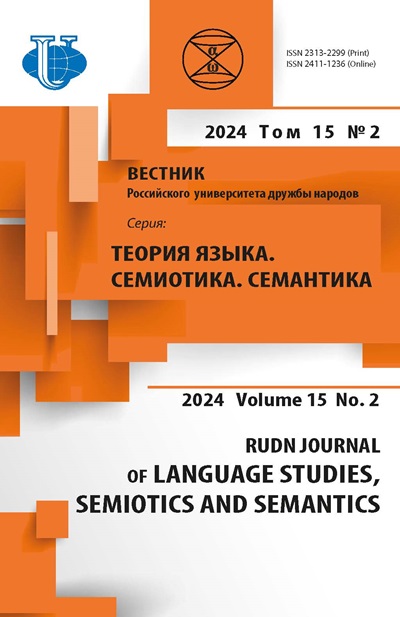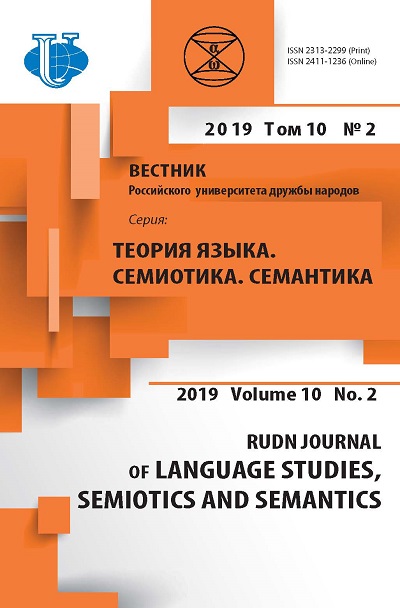FOSSILIZATION, COMMUNICATIVE RATIONALITY AND COMMUNICATION STRATEGIES IN SECOND LANGUAGE LEARNING
- Authors: Vavilova Z.E.1, Broadbent J.T.2
-
Affiliations:
- Kazan State Power Engineering University
- Professional Education for Academic Requirements (PEAR) Academy
- Issue: Vol 10, No 2 (2019)
- Pages: 522-531
- Section: PRAGMALINGUISTICS
- URL: https://journals.rudn.ru/semiotics-semantics/article/view/21766
- DOI: https://doi.org/10.22363/2313-2299-2019-10-2-522-531
Cite item
Full Text
Abstract
Fossilization was first defined in 1972 as a failure, or an ultimate attainment in adult second language acquisition that falls short of native-speaker competence. It represents a final stage in the interlanguage development of the individual learner and characterizes all but a very few adult second language learners. Over the 40 years or so since the term appeared, fossilization in adult second language acquisition has come to be widely accepted by scholars as a genuinely existing phenomenon. Fossilization is now viewed as permanent and resistant to correction either through instruction or acculturation. However, no universally accepted definition or explanation of fossilization has achieved universal acceptance. This paper attempts to add an extralinguistic perspective on fossilization and its possible outcome in the communicative practice of adult L2 speakers by building a bridge between linguistics and teaching languages, on the one hand, and philosophy of communication, on the other. Habermasian concept of communicative rationality is applied to demonstrate that oratory and writing skills ensure a more significant role in a dialogue, which seems to be sufficient grounds for fighting fossilization. In terms of the theory of speech acts, the paper attempts to trace the mechanism of fossilizing in a transition from the inner space of an individual consciousness and intent (illocution) to the outer space of the perlocutionary consequence when a locutionary distortion of the speech itself does not affect the speaker’s intent and he / she receives no feedback of the error made. Several factors inhibiting the effectiveness of such corrective feedback are touched upon, as well as certain strategies adopted by second language learners in their communicative efforts.
About the authors
Zhanna Evgenievna Vavilova
Kazan State Power Engineering University
Email: zhannavavilova@mail.ru
senior lecturer, Department of Philosophy and Media Communications, Kazan State Energy University 51, Krasnoselskaya Str., Kazan, Russia, 420034
John Taylor Broadbent
Professional Education for Academic Requirements (PEAR) Academy
Email: johntaylorbrdbnt@hotmail.com
consultant, language training center “PEAR Academy” 2/127, Rundle Mall Level, Adelaide, Australia, SA5000
References
- Selinker, L. (1972). Interlanguage. International Review of Applied Linguistics in Language Teaching, 10 (2), 209-232.
- Han, Z.-H., & Odlin, T. (2005). Studies of fossilization in second language acquisition. Multilingual Matters.
- Trillo, J.R. (2009). Discourse markers. In J.L. Mey (Ed.) Concise Encyclopedia of Pragmatics (pp. 191-194). Elsevier.
- Habermas, J. (2015). The Philosophical Discourse of Modernity. Twelve Lectures. Translated by Frederick Lawrence. John Wiley & Sons.
- Hymes, D. (1972). On communicative competence. In J.B. Pride, J. Holmes (Eds.) Sociolinguistics: Selected Readings. Harmondsworth: Penguin. pp. 269-293.
- Shapira, R.G. (1978). The Non-Learning of English: Case Study of an Adult. In E. Hatch (Ed.) Second Language Acquisition (pp. 246-255). Rowley, MA: Newbury House.
- Green, M. (2007). Speech Acts. Stanford Encyclopedia of Philosophy. Retrieved April 14, 2018. URL: https://plato.stanford.edu/entries/speech-acts/.
- Wang, J. (2011). Impacts of Second Language Classroom Instruction on IL Fossilization. Journal of Cambridge Studies, 6 (1), 57-75.
- Bialystock, E. (1980). Oral communication strategies for lexical difficulties. In Interlanguage Studies Bulletin, 5 (1), 3-30.
- Broadbent, J.T., & Vavilova, Zh. (2015). Bilingual identity: issues of self-identification of bilinguals in Malaysia and Tatarstan. In 3L: Language, Linguistics and Literature. The Southeast Asian Journal of English Language Studies, 21 (3), 141-150.
- Galieva, A., Vavilova, Zh., & Gafarova, V. (2017). Developing Tatar Corpus-Based Dictionaries for Educational Purposes. In 11th International Technology, Education and Development Conference INTED-2017 Proceedings (pp. 9014-9022). Spain, Valencia: Inted.













